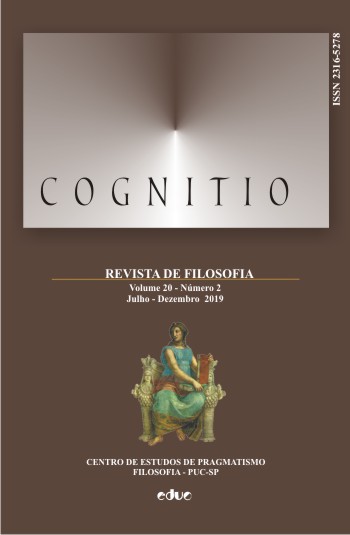Emotional, energetic, and entelic interpretants: epistemic and ethical pragmaticism in Ibri, Peirce, and Aristotle
DOI:
https://doi.org/10.23925/2316-5278.2019v20i2p304-342Keywords:
Agapism, Developmental Teleology, Emotional Interpretant, Energetic Interpretant, Hexis, Logical Interpretant, Semeiosis, Tychism.Abstract
Peirce’s ontological semeiosis reprised Aristotle’s sense of rational praxis in their shared sense of the mediating function of the Logical Interpretant. The paper proceeds in three parts. The first outlines Ivo Assad Ibri’s conceptualization of Peirce’s semeiosis in respect to the difference between the Emotional and Logical Interpretant, particularly with regard to the former in the “degenerate” modes of fixing belief and conduct; the second explicates Peirce’s initial conceptualization of that doctrine in his treatment of the “Man-sign” in “Some Consequences of Four Incapacities” (1868); a third part features Aristotle’s Nicomachean Ethics as classical provenance of the main trajectory of Peirce’s semeiosis, by way of correlating Peirce’s concept of development teleology with Aristotle’s parallel concept of active dispositional character (hexis) energized by the ethical mean (mesotes) as the pragmatistic interpretant of conduct.Downloads
Published
2020-02-16
How to Cite
Dilworth, D. (2020). Emotional, energetic, and entelic interpretants: epistemic and ethical pragmaticism in Ibri, Peirce, and Aristotle. Cognitio: Revista De Filosofia, 20(2), 304–342. https://doi.org/10.23925/2316-5278.2019v20i2p304-342
Issue
Section
Cognitio Papers









